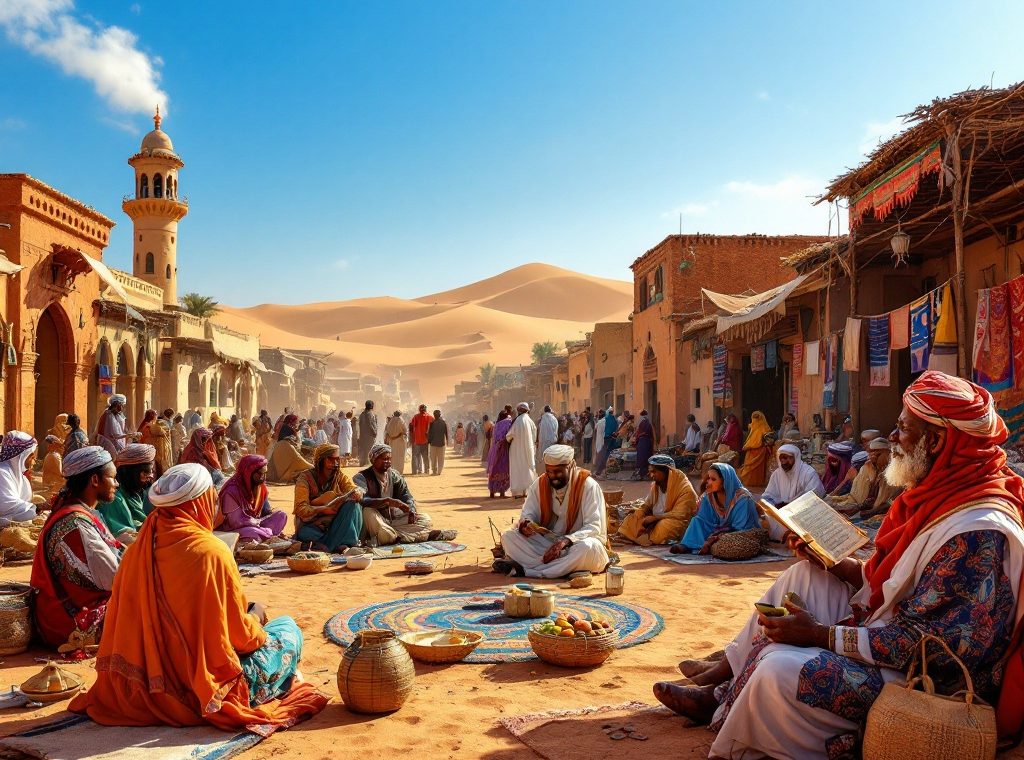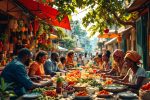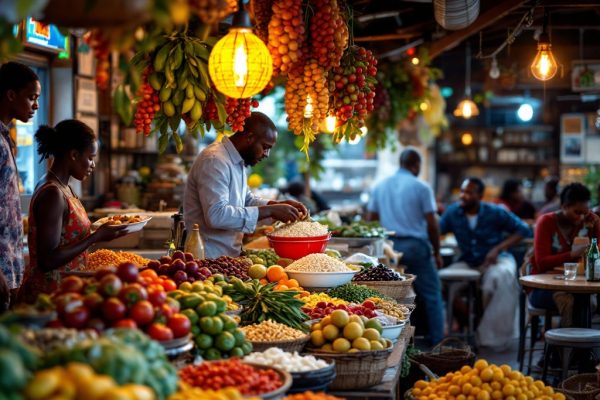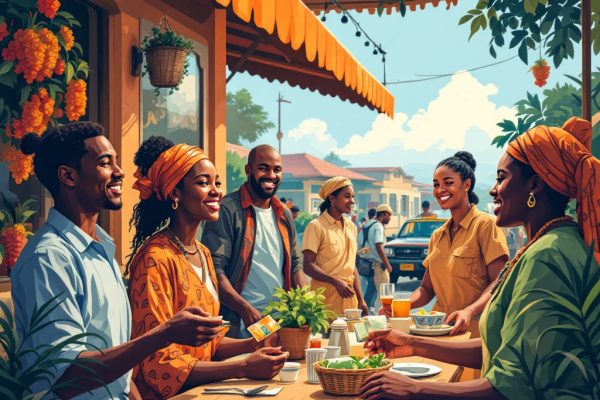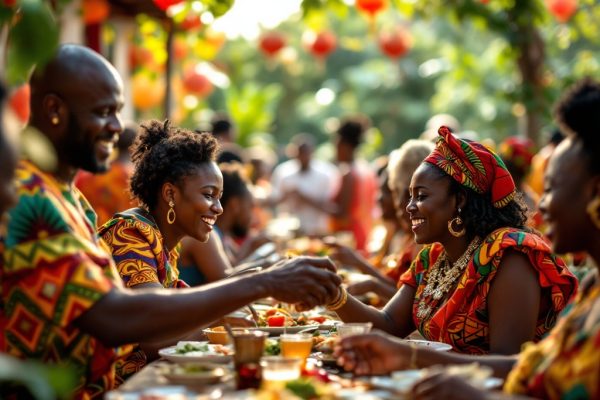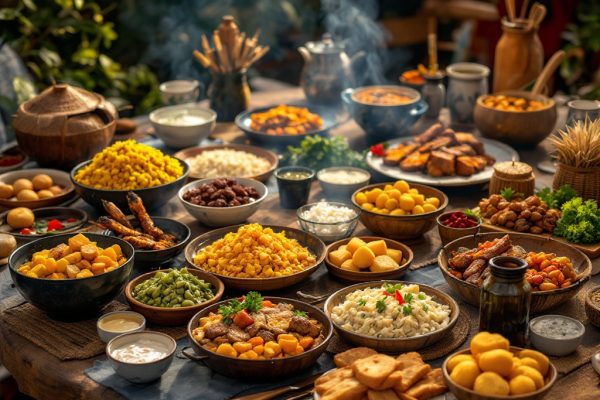Life in Mauritania: Customs, Traditions, Beliefs
Journey into the heart of Mauritania, a land where ancient nomadic traditions meet the modern world. Explore the rich tapestry of Moorish culture, from the Bidan and Haratin to the Bedouin and Berber tribes, each with their unique customs and challenges. Discover the profound influence of Islam, shaping daily life and social structures. Experience the vibrant celebrations, music, and storytelling that define Mauritanian heritage. Uncover the complexities of family dynamics, gender roles, and social etiquette. Delve into this captivating cultural landscape and broaden your understanding of Mauritania.
Important information
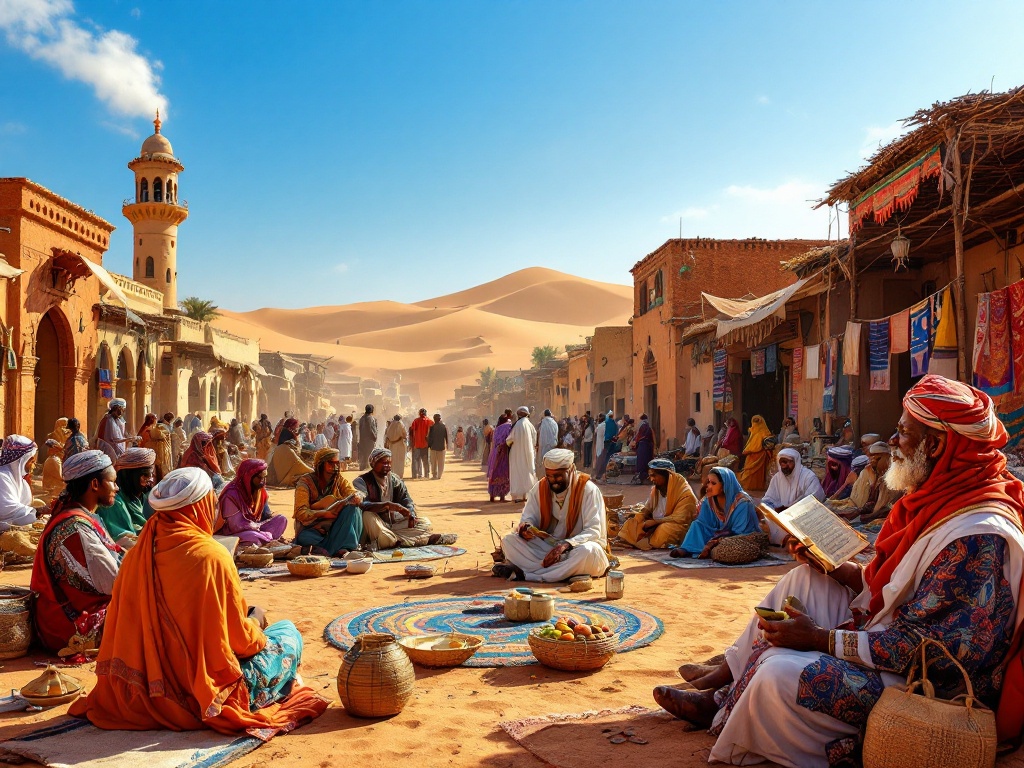
- Islam is the dominant religion, shaping daily life, social norms, and the legal system, which is based on Sharia law.
- Mauritania has a rich nomadic heritage, primarily among the Bedouin, Berber, and Moorish tribes, though these groups face modern challenges like desertification and social discrimination.
- Hassaniya, an Arabic dialect, is the most commonly spoken language, although Arabic is the official language.
- Mauritanian society is traditionally patriarchal, with strong family ties, respect for elders, and practices like polygamy and arranged marriages, although modernization is bringing some changes.
- Hospitality is highly valued, with communal meals and tea ceremonies playing an important role in social interactions.
Understanding the Cultural Landscape of Mauritania
Islam is deeply ingrained in Mauritanian culture, shaping daily routines, social interactions, and even family structures. Arabic, central to both communication and religious observance, further strengthens this cultural identity. These intertwined elements create the unique tapestry of Mauritanian life.
Ethnic Diversity and Nomadic Heritage
Mauritania’s culture is deeply rooted in its nomadic heritage, with camels, goats, and sheep traversing the Sahara Desert. This is especially apparent among the Bedouin and Berber tribes, whose nomadic lifestyle shapes everything from family dynamics and social interactions to their rich cultural practices. Among these groups, three tribes stand out: the Tuareg, known for their indigo-dyed garments; the Haratin, recognized for their agricultural and herding skills; and the Moors, a unique blend of African and Arabic traditions who raise livestock and guide caravans across the desert. However, these communities now face modern challenges, such as desertification and climate change, which threaten their traditional way of life. They also struggle with limited access to essential services and ongoing social discrimination.
The Moors: Bidan and Haratin
Mauritania’s Moorish population consists of two main groups: the Bidan and the Haratin. The Bidan, often lighter-skinned, have historically held a higher social status. The Haratin, typically darker-skinned, have traditionally occupied a lower social position, significantly influencing Mauritanian society. Their crucial agricultural work, as farmers and herders, has been vital to oasis development and continues to shape Mauritania’s agricultural landscape.
Nomadic Tribes: Bedouin and Berber
Mauritania’s nomadic heritage comes from its Bedouin and Berber tribes, who travel across the Sahara Desert herding camels, goats, and sheep. The Bedouin are known for their camel handling and navigation skills, which are an important part of Mauritanian culture. The Berber people, with their rich history and diverse traditions, also add to the nation’s cultural richness. However, both groups are facing modern challenges, such as desertification and urbanization, that threaten their traditional lifestyles.
Bedouin
Known for their expertise in camel handling and navigation, integral to Mauritanian culture.
Berber
Contribute to the nation’s cultural tapestry with their rich history and diverse traditions.
Both groups face modern threats: desertification and urbanization, challenging their traditional way of life.
Religious Beliefs and Practices in Mauritania
Islam, the dominant religion in Mauritania, deeply influences the lives of its primarily Sunni Muslim population. It serves as a moral compass, guiding daily routines and shaping societal norms and legal frameworks. Religious practices are woven into everyday life, from the five daily prayers (Salah) and fasting during Ramadan to attending Friday congregational services. Sufism, a mystical branch of Islam, also holds a significant role, adding to the spiritual landscape with its various orders. Furthermore, Sharia, or Islamic law, forms the basis of the legal system, affecting areas such as marriage, inheritance, and criminal justice.
The Role of Islam in Daily Life
Islam is deeply ingrained in Mauritanian life, influencing various aspects of society. It shapes daily routines, including meals adhering to halal dietary laws and the five daily prayers. Social interactions and legal matters, such as marriage and inheritance, are guided by Sharia law. Religious holidays like Eid al-Fitr and Eid al-Adha are major cultural events. The faith fosters a strong sense of community and provides a moral compass. Even everyday greetings, like “Salaam alaykum,” reflect Islam’s profound impact on Mauritanian society.
Celebrations: Eid al-Fitr and Eid al-Adha
Eid al-Fitr marks the culmination of Ramadan, the sacred month of fasting observed by Muslims. This joyous occasion is mirrored by Eid al-Adha, the Festival of Sacrifice, commemorating Abraham’s devotion. Both holidays hold deep significance, bringing communities together for prayer and shared meals, strengthening bonds and fostering a sense of belonging. These celebrations are further enriched by Mauritania’s unique cultural traditions, weaving together faith and heritage into a vibrant tapestry.
Language and Communication in Mauritania
Arabic is the official language of Mauritania, primarily used in government, education, and formal settings.
Hassaniya, an Arabic dialect, is the most commonly spoken language among the population. It reflects Mauritania’s unique culture and incorporates elements of Berber languages.
Arabic and Hassaniya: The Lingua Franca
While Arabic is Mauritania’s official language, Hassaniya, an Arabic dialect influenced by Berber, is more commonly spoken. It connects diverse groups like Moors, Bedouins, and Berbers. Other languages, including Pulaar, Soninke, Wolof, and French, also contribute to the linguistic landscape. Arabic and Hassaniya are particularly important for social interaction and cultural exchange throughout the nation.
Role of Oral Literature and Storytelling
Storytelling is an integral part of Mauritanian culture, acting as a vital medium for preserving history and transmitting traditions and values. Epic poems, riddles, and folk tales, along with the rhythmic beauty of Islamic poetry, are shared at community gatherings and festivals. This rich oral tradition thrives due to the limited accessibility of written literature. It ensures cultural continuity through ancient legends and stories of daily life, keeping Mauritanian heritage vibrant.
Family Structure and Social Dynamics
Mauritanian families are traditionally patriarchal, led by the eldest male. Extended families often share multi-generational homes, where children are cherished and respect for elders is paramount. While polygamy and arranged marriages are common, shaping family roles and gender interactions, modernization is driving change. Increasing urbanization has led to more women entering the workforce and girls pursuing education, gradually shifting traditional family dynamics.
Patriarchal Family Units
Mauritanian families are traditionally patriarchal, with fathers and husbands holding primary authority and making key decisions. This structure heavily influences both family dynamics and societal norms. However, gradual shifts are occurring.
Importance of Children and Respect for Elders
In Mauritania, children are treasured as a family’s hope for the future. Respect for elders is paramount, reflecting the importance of family honor and established traditions. This reverence is reinforced by both Islamic teachings and modern education. Families and communities collaborate to nurture children’s morals and social skills, creating strong ties within the family unit and the broader community. This collective upbringing forms the bedrock of Mauritanian society.
Polygamy and Arranged Marriages
Polygamy is permissible under Islamic law, and this is reflected in Mauritanian customs. Arranged marriages, common throughout the country, reinforce traditional family structures. Social standing and familial ties are paramount in these unions.
Traditional Customs and Etiquette
Mauritanian culture deeply values hospitality, treating guests with the utmost respect and offering generous amounts of food and drink. Warm greetings are essential, often inquiring about family and well-being. Food plays a central role in their lives, and communal meals, known as “tebbou,” foster strong social bonds. Couscous and grilled meats are popular dishes, and tea holds a special significance in their traditions. Sharing tea is a ritualistic practice, often involving multiple rounds of brewing and serving, symbolizing generosity and respect.
Hospitality as a Cultural Cornerstone
Mauritanian culture places a high value on hospitality, viewing it as a symbol of honor and dignity. Guests are considered blessings, and generosity is expressed through sharing traditional dishes like thieboudienne and mbeyu. Ensuring guests’ comfort reinforces community bonds and cultural identity, reflecting the deep importance of communal ties. As a guest, remember to eat with your right hand.
Social Etiquette and Greeting Customs
Greetings: greet people formally with a handshake and inquiries about their family’s well-being. The traditional “As-salamu alaykum” (peace be upon you) is common.
Right Hand Use: always use your right hand for eating, drinking, and greetings, as the left is considered unclean.
Public Displays of Affection: public displays of affection are frowned upon.
Footwear: remove your shoes before entering someone’s home.
Gifts: while gifts are appreciated, they aren’t necessary for an initial visit.
Hospitality: it’s considered polite to accept any food or drink offered.
Dress Code: modest dress is important, particularly for women.
Conversation: avoid discussing personal matters when first meeting someone.
Respect for Elders: showing respect for elders is crucial.
Patience: patience is a highly valued trait.
Cuisine and Communal Eating Habits
In Mauritania, mealtime transcends mere sustenance; it’s a cornerstone of their culture. Gathering to share food is a frequent practice, reinforcing social connections within the community. This shared dining experience embodies Mauritanian hospitality.
Staple Foods: Couscous and Grilled Meats
Couscous is a staple of Mauritanian cuisine, often served with grilled meats such as lamb, beef, and goat, reflecting the country’s pastoral traditions. These popular meats are seasoned with local spices like cumin, coriander, and mint, which create the distinctive flavors of Mauritanian cooking. Sharing meals is a common practice, highlighting the social importance of food in Mauritanian culture.
Communal Eating as a Social Activity
In Mauritania, sharing a meal is more than just eating; it’s a vital social custom that strengthens community ties and powerfully expresses hospitality. This communal dining practice is deeply rooted in their culture, forming a core element of Mauritanian identity. The act of sharing food symbolizes generosity and demonstrates respect.
Gender Roles and Social Challenges
In Mauritania, traditional gender roles are deeply ingrained. Men dominate public life, controlling economic and political affairs. Conversely, women’s lives revolve around the home, focusing on childcare and household management. While motherhood is highly valued, women face significant limitations. Their rights and opportunities are restricted, both legally and socially.
Challenges for Mauritanian Women
- Inheritance laws often disadvantage them.
- They encounter legal obstacles in Islamic courts.
- The practice of polygamy creates serious challenges.
- The prevalence of female circumcision is a significant issue.
Traditional Gender Roles
Men control economic and political affairs.
Women’s roles center around childcare and household management.
Women’s rights and opportunities are restricted, both legally and socially.
Women in Mauritanian Society
In Mauritania, women occupy a paradoxical position, esteemed within their families yet constrained by societal norms. While they play vital roles in their homes, traditionally focusing on childcare and domestic duties, they frequently face discrimination in legal matters and inheritance. However, a shift is occurring. Increasing numbers of Mauritanian women are pursuing education and entering the workforce, marking a significant step toward greater equality.
Arts, Music, and Festivals
Mauritanian music boasts a rich tradition, featuring unique instruments like the four-stringed lute (tidinit) and the harp-like ardin. Percussion instruments further enhance the vibrant soundscape. These instruments create music for important occasions, celebrating life events, religious festivals, and cultural heritage. In Mauritania, festivals play a vital role, bringing communities together to share meals and artistic expression, fostering celebration and connection.
Traditional Music and Instruments
Music is deeply ingrained in Mauritanian culture, serving as a powerful connector and a vibrant expression of its rich traditions. The Moors, the predominant ethnic group, shape the country’s unique musical landscape primarily through instruments like the tidinit (a stringed instrument) and the tbal (a rhythmic drum). Iggawin musicians, for instance, play a crucial role in preserving history by singing praises of warriors and noblemen. Music is at the heart of every celebration, from weddings and festivals to everyday gatherings. It is often interwoven with dynamic dance forms performed by groups like the haratine and griots. While female musicians are less prevalent, some, like the celebrated Dimi Mint Abba, have achieved widespread recognition. Mauritanian music also carries significant social messages, narrating historical events and transmitting cultural values. This vibrant musical heritage strengthens national identity and gives a powerful voice to the Mauritanian people.
Festivals Celebrating Cultural Heritage
Mauritania’s vibrant festivals are essential to its cultural identity, showcasing rich traditions such as music, dance, and captivating storytelling. The Nouakchott International Festival of Nomadic Culture, for instance, is a prime example of this celebration of nomadic heritage. Religious festivals also play a significant role, with Mawlid al-Nabi (Prophet Muhammad’s birthday) widely observed. Furthermore, Eid al-Fitr and Eid al-Adha are marked with prayers and joyful festivities, strengthening communities and transmitting cultural values to future generations. These festivals offer a unique opportunity to experience Mauritania’s rich cultural tapestry.

